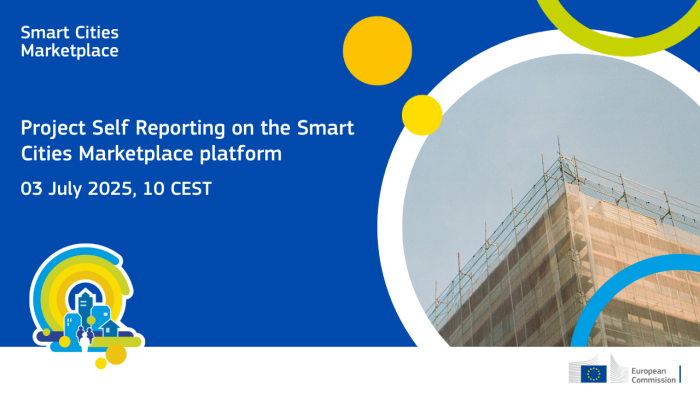
The Smart Cities Marketplace (SCM) took a significant step forward in advancing standardised project monitoring across Europe with the summer 2025 webinar on its updated Self-Reporting Tool (SRT). Presented by Rudy Rooth (Monitoring Expert, Smart Cities Marketplace / DNV) and Eelco Kruizinga (Matchmaking Expert, Smart Cities Marketplace / DNV), the session provided a detailed walkthrough of how the tool supports cities and project developers in documenting the impact of their low-carbon initiatives in line with EU expectations. The SRT forms part of the Marketplace’s broader mission, initiated by DG ENER, to accelerate the clean energy transition by connecting technical expertise with local ambitions.
The Self-Reporting Tool is designed to harmonise performance monitoring across a wide range of EU-funded and voluntarily contributing projects. It allows for structured data collection through Excel-based templates, tailored to six key thematic areas: new buildings, refurbished buildings, energy systems, ICT (including smart lampposts and energy management systems), transport and mobility, and Positive Energy Districts (PEDs). Each category contains detailed indicators across technical, environmental, economic, and social dimensions—such as CO₂ reductions, primary energy savings, system flexibility, payback times, and citizen involvement.
A core advantage of the tool is its ability to accommodate both design-phase and post-implementation monitoring data, with forms that are compatible with the main SCM database, which already covers data from 2010 to 2024. The KPI structure enables flexible filtering and aggregation, allowing for analysis by technology type, geographical area, or intervention scale. As part of the expanded functionality, users now benefit from built-in guidance.
The webinar also highlighted the process for participating projects, which includes registering via a project intake form, defining demonstrator sites and specific demonstrator activities (Fields of Action), and uploading design and monitoring data for each intervention. The visualisation and public disclosure of KPIs through the portal further support transparency and peer learning among European cities.
With its pragmatic approach and alignment with existing EU call requirements, the SRT enables cities—large and small—to consistently monitor their climate performance. It is especially valuable for projects not contractually obliged to report under EU programmes but eager to benchmark their progress and contribute to a shared knowledge base. Participants are encouraged to explore the full set of user guides and sample data visualisations, now available on the Marketplace’s website, and to contact the SCM team at info@smartcitiesmarketplace.eu to begin the onboarding process.
For more details, including technical guidance and access to reporting templates, visit:
Self Reporting Tool (SRT) guide | Smart Cities Marketplace
